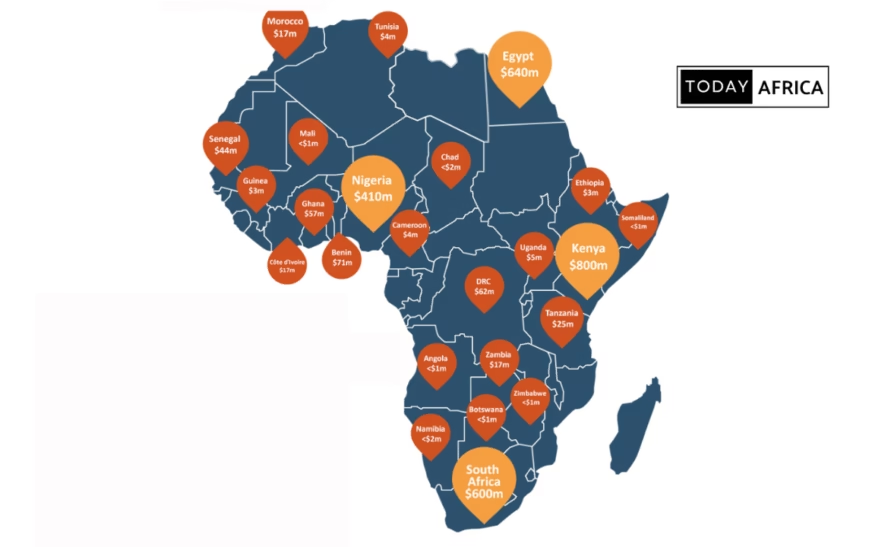Africa is not only a continent of untapped potential but a continent of unstoppable momentum.
From fintech hubs to solar farms lighting up rural villages, African entrepreneurs are building solutions that solve local problems and scale globally.
The opportunities have never been more exciting. With one of the world’s youngest populations, rapid urbanization, and the fastest-growing mobile internet penetration on the planet, Africa is ripe for innovation across multiple sectors.
But for new and aspiring business owners, one big question remains: which industries offer the fastest growth and the biggest returns?
In this article, we’ll break down the fastest-growing industries for African entrepreneurs, backed by real data and practical entry points.
Let’s dive into the industries shaping Africa’s economic future — and how you can be part of it.
Top 10 Fastest-growing Industries for African Entrepreneurs
1. Fintech (Payments, banking, credit & insurtech)
Fintech continues to dominate Africa’s startup ecosystem. In 2024 fintech captured a huge share of investment and deal activity — becoming the largest single sector by funding and deal count.
Partech’s 2024 Africa tech report shows fintech accounted for roughly 60% of total equity funding in the region that year, highlighting how payments, digital wallets, lending, and insurtech attract capital and customers across borders.
Why it’s attractive: huge unbanked/underbanked populations, rapid mobile adoption, and regulatory sandboxes in many countries create fertile ground.
Examples include homegrown champions like M-Pesa (East Africa’s mobile payments trailblazer), Flutterwave and Paystack (payments infrastructure), and Chipper Cash (cross-border remittances).
Successful fintech founders focused on solving real pain points — affordability, trust, and onboarding — often scale quickly by plugging into merchant networks and telco partnerships.
How to get in
- Start with a niche (e.g., merchant payouts, SME lending, payroll, or embedded finance for specific industries).
- Build robust KYC and compliance early.
- Partner with banks/telcos.
- Design for low-data mobile users.
- Consider revenue models such as transaction fees, subscription APIs, and value-added services (e.g., credit scoring, insurance bundles).
2. Renewable energy
Africa faces chronic energy gaps — but that creates an enormous market for decentralized energy solutions.
Private clean energy investment in Africa has surged: clean energy private investment tripled from roughly USD 17 billion in 2019 to nearly USD 40 billion in 2024, driven strongly by solar and distributed solutions.
The falling cost of solar PV and rising interest in microgrids and home systems underpin this growth.
Successful founders are delivering pay-as-you-go solar home systems, mini-grids, and energy-as-a-service for enterprises. Think M-KOPA, Bboxx, and numerous local modular-solar players.
Opportunities for entrepreneurs include hardware distribution and financing, IoT-enabled monitoring, energy storage & battery-swapping infrastructures, and service models for SMEs (cold chain, small factories).
How to get in
- Combine hardware with innovative financing (PAYG).
- Build strong logistics and after-sales teams.
- Aim for partnerships with development finance institutions (DFIs) for early-stage support.
3. Agritech
Agriculture feeds most African economies and employs a large share of the population — making agritech a high-impact, high-demand sector.
While funding has been volatile, agrifoodtech shows recovery signs; reports show agrifoodtech raised meaningful sums in 2024 (e.g., AgFunder tracked growth and recovery in H1 2024), and decade-long investment in agrotech has built a strong pipeline of companies.

Briter Bridges noted that African agrotech startups raised over $1.5 billion across the last decade, a sign of sustained investor interest.
Winners focus on farmer input access, market aggregation, logistics, and cold chain. Twiga Foods (Kenya) streamlined produce distribution for retailers; Aerobotics adds AI-driven pest detection; Farmcrowdy and other platforms connect smallholders to financing and markets.
Entrepreneurs can add value by reducing post-harvest loss, improving traceability, providing microloans, or enabling off-takers with subscription purchasing.
How to get in
- Work closely with farmer cooperatives.
- Prove unit economics at small scale.
- Prioritize mobile-first UX — even SMS-first — for farmer customers.
Read Also: How Mobile Money is Changing Business Across Africa
4. E-commerce
E-commerce growth across Africa is accelerating as mobile internet and digital payments scale.
Beyond classic marketplaces, social commerce (selling via WhatsApp, Instagram, TikTok) and live commerce formats are gaining traction globally, and African merchants are adapting these formats rapidly.
Global trends (e.g., McKinsey’s coverage of social-commerce growth) point to the broader playbook entrepreneurs can adopt.
Examples like Jumia showed how pan-African marketplaces can scale; more recent winners combine tight logistics networks (local warehouses, dark stores), social channels, and influencer-driven campaigns.
Micro-entrepreneurs sell via WhatsApp catalogs and TikTok Shop-style channels in markets where standard e-commerce UX is still nascent.
How to get in
- Build trust (returns, buyer protection)
- Focus on last-mile fulfillment
- Embrace social/creator partnerships to reach shoppers.
- Niche verticals (beauty, fast-moving consumer goods, fashion) are often easier to monetize quickly.
5. Healthtech
Health systems in many African countries face shortages of doctors, variable infrastructure, and fragmented supply chains.
Healthtech startups that provide telemedicine, digital pharmacies, diagnostics, and supply-chain transparency are helping bridge gaps.
Investors have been backing telehealth platforms and digital-first clinical services that reduce cost and improve access.
Companies such as mPharma (supply chain + pharmacies), Helium Health (health records & hospital management), and a wave of telemedicine apps demonstrate how software + local clinical partnerships can scale.
Opportunities include chronic disease management, mobile diagnostics, tele-ICU services, and medical supply marketplaces.
How to get in
- Partner with licensed clinicians.
- Prioritize data privacy and regulatory compliance.
- Consider B2B hospital SaaS models as an early revenue path.
6. Edtech
An expanding youth population plus skills mismatches mean demand for affordable, job-relevant learning is huge. Edtech players offering exam prep, vocational training, and corporate upskilling are growing.
Initiatives like HolonIQ’s Africa EdTech 50 illustrate a maturing edtech ecosystem with startups addressing everything from K-12 to workforce training.
Popular models include mobile-first microlearning, partnerships with employers for placements, and hybrid offline-online instruction.
uLesson and other regional players have shown traction by tailoring content to curricula and low-bandwidth contexts.
How to get in
- Start with a focused user segment (exam prep, coding for youth, or workplace reskilling).
- Test pricing via freemium or tokenized micro-payments.
- Partner with schools or corporations for distribution.
See Also: Top 5 Crypto OTC Trading Platforms in Nigeria This Year
7. Logistics
Efficient logistics is the backbone of e-commerce, agrifood, and retail.
Africa’s fragmented infrastructure creates chronic delivery and warehousing challenges, which opens huge opportunities for logistics innovators — from route-optimization software to asset-light courier networks and B2B freight platforms.
Companies like Kobo360 and Lori Systems tackled long-haul trucking and freight logistics, using tech to match demand and capacity, improving transparency, and reducing empty miles.

For entrepreneurs, micro-fulfillment centers, cold-chain solutions, and local courier APIs are meaningful entry points.
How to get in
- Focus on modular solutions (e.g., APIs for merchants).
- Build partnerships with local transport owners.
- Demonstrate measurable cost or time savings to clients.
8. Manufacturing
Rising input costs, supply-chain shocks, and push for local jobs drive interest in localized manufacturing.
Africa’s giant consumer markets make local production of goods (packaged foods, textiles, FMCG) increasingly viable — especially with newer financing channels and improved technical support.
The Financial Times and other analyses of fast-growing African companies underscore how local manufacturing and value-added can anchor revenue growth.
Model entrepreneurs start with contract manufacturing, niche branded goods, or B2B inputs (components for agritech hardware, packaging).
Additive manufacturing (3D printing) for spare parts and light assembly for appliances are other practical paths.
How to get in
- Validate demand with pilot contracts.
- Minimize capex via contract manufacturers.
- Secure a stable supply of raw materials — possibly by negotiating supplier financing or off-take agreements.
Read Also: Fintech in Africa: Trends to Watch in 2025
9. Creative industry
The creative economy is a sleeper hit. Nigerian music, Nollywood films, African fashion, and emerging gaming studios are attracting a global audience and revenues through streaming, licensing, and fashion collaborations.
Intellectual property and digital distribution make scaling cultural products far more feasible than before.
Nollywood produces thousands of films annually; artists and labels monetize through streaming (Boomplay, YouTube), concerts, and brand partnerships.
Gaming studios are small but growing, targeting mobile-first players. Fashion designers are building direct-to-consumer (DTC) brands using Instagram and e-commerce.
How to get in
- Protect IP.
- Leverage social platforms and distribution partners.
- Experiment with hybrid monetization: streaming royalties, events, brand deals, and merchandise.
10. Enterprise SaaS, AI & data services
As African businesses digitize, demand for industry-specific SaaS (finance, HR, supply chain, retail analytics) rises.
Adding AI/ML capabilities (fraud detection, demand forecasting, credit scoring) gives founders a high-value proposition.
Global investors increasingly recognize the recurring revenue profiles and margin potential of SaaS companies serving African markets.
How to get in
- Start by solving narrow problems (e.g., inventory forecasting for informal retailers or loan management for microfinance institutions).
- Build for integration (APIs).
- Prioritize security.
- Price for local affordability.
- Demonstrating clear ROI helps secure pilot customers and traction.
See Also: 5 African Countries Leading the Tech Boom in 2025
Conclusion
The fastest-growing industries for African entrepreneurs aren’t just numbers on a report — they represent real, tangible opportunities to create wealth, solve pressing challenges, and shape the continent’s future.
From fintech driving financial inclusion to renewable energy bringing power to the last mile, these sectors are growing because they meet urgent needs with scalable solutions.
The key to success isn’t trying to chase every trend, but rather:
- Choose one industry that aligns with your skills, resources, and passion.
- Start small, test your idea, and refine your model before scaling.
- Leverage partnerships, local insight, and technology to outpace competitors.
Africa’s economic story is still being written, and the next chapter will be led by entrepreneurs bold enough to act now.
FAQs
Which single industry has the most investment right now?
Fintech has consistently attracted the largest share of equity funding in Africa (fintech accounted for a majority share of equity funding in 2024) — making it the single most-funded sector. That said, renewables and agrifoodtech are also drawing strong interest.
Are hardware businesses (solar, manufacturing) still viable given high capex?
Yes — hardware plays are viable when paired with innovative financing (PAYG for solar), reliable distribution, and recurring revenue (service contracts). Many successful African ventures combine hardware with financing and servicing to reduce upfront customer cost.
How can a founder in a smaller African market compete?
Focus on a narrowly defined problem, build strong unit economics, partner with regional players (telcos, cooperatives), and consider regional expansion later. Niche dominance can be a springboard to wider markets.
Which industries are most likely to get government or DFI support?
Renewable energy (microgrids, solar), agrifood, and healthcare often attract support from DFIs and public programs because they tie directly to development goals. Entrepreneurs in these sectors should explore blended finance and grant opportunities.
How important is regulatory compliance?
Critical — especially in fintech and healthtech. Early regulatory engagement, licensing or sandbox use, and strong KYC/data-protection practices reduce friction and risk as you scale.
Leave a comment and follow us on social media for more tips:
- Facebook: Today Africa
- Instagram: Today Africa
- Twitter: Today Africa
- LinkedIn: Today Africa
- YouTube: Today Africa Studio
















